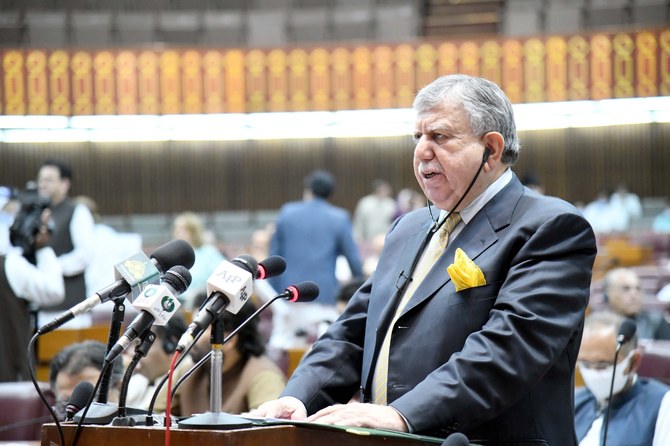ISLAMABAD: Pakistan’s finance minister Shaukat Tarin will present a contentious supplementary finance bill, popularly known as the ‘mini budget,’ before the Senate today, Tuesday, amid warnings by opposition lawmakers and economists that the measures it introduces are anti-growth and will trigger inflation.
The bill was presented in the lower house of parliament last week and aims to end tax exemptions on nearly 150 items as a prior action for the revival of a $6 billion loan program from the International Monetary Fund (IMF). Opposition politicians and economic experts say the new measures will usher in a new wave of inflation, which the government denies.
According to a 16-point agenda issued by the Senate Secretariat on Monday, Finance Minister Shaukat Tarin will “lay before the Senate a copy of the money bill, the Finance (Supplementary) Bill, 2021, and move that the Senate may make recommendations, if any, to the National Assembly on the bill under Article 73 of the Constitution,” Pakistan’s Dawn newspaper reported.
Meanwhile, Shehbaz Sharif, the current leader of the opposition in the National Assembly, has described the mini budget as a “death-knell” for the country while Bilawal Bhutto-Zardari, the leader of the major opposition party, the Pakistan Peoples Party, has called it an “anti-public budget.”
The new finance bill will empower the government to level a uniform 17 percent General Sales Tax (GST) on goods that were taxed at 5% or 12% rates. The amendment will also enable the government to generate over Rs343 billion in additional revenue.
The measures Pakistan has agreed to meet for the IMF would have a monetary impact of around Rs600 billion, including around Rs350 billion through tax exemption withdrawals and new tax imposition, Rs200 billion through cuts in development funds, and Rs50 billion through other adjustments.
Apart from the tax exemption withdrawals, the mini-budget also proposes the imposition of new taxes on sectors which were earlier zero-rated.
The government has rejected the opposition’s fears of the mini-budget causing more inflation in Pakistan. Finance minister Shaukat Tarin has said new taxes worth only Rs2 billion were being imposed, which would not lead to widespread inflationary pressures.
Passing the mini-budget is not the only action the government has to take for the revival of the IMF program. The international money lender wants the government to grant complete autonomy to the State Bank of Pakistan (SBP) via amendments to the State Bank of Pakistan (SBP) Amendment Bill 2021.
The executive board of the IMF will meet on January 12, 2022, to decide if it will revive the stalled loan package for Pakistan, approved in 2019 to rein in mounting debts and stave off a looming balance of payments crisis, in exchange for tough austerity measures.















